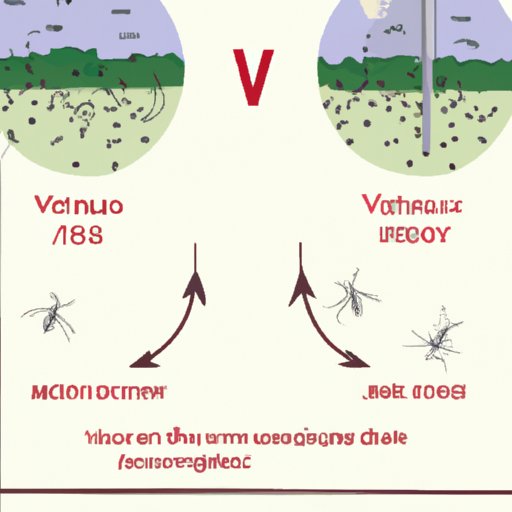Introduction
Mosquitoes are small, winged insects that feed on the blood of animals and humans. They are one of the most dangerous creatures in the world due to their ability to spread life-threatening diseases such as malaria, dengue fever, and yellow fever. As a result, it is important to understand how far mosquitoes travel to bite in order to prevent the spread of these diseases.
When a mosquito bites, it injects saliva into the skin of its host. This saliva contains proteins that can cause an allergic reaction, leading to itching, redness, and swelling. In addition, some species of mosquitoes can transmit diseases through their saliva, making them even more dangerous.

Comparing the Travel Distance of Different Mosquito Species
The distance a mosquito travels to bite depends on several factors, including the type of mosquito, the environmental conditions, and the availability of food sources. Different species of mosquitoes have different behaviors and travel distances. For example, Anopheles mosquitoes, which are responsible for transmitting malaria, typically travel up to 3 miles from their breeding grounds in search of food. On the other hand, Culex mosquitoes, which are known to spread West Nile virus, can travel up to 5 miles in search of food.
Investigating How Factors Such as Wind Speed and Temperature Affect a Mosquito’s Travel Distance
In addition to the type of mosquito, the environmental conditions can also affect a mosquito’s travel distance. For instance, wind speed has been found to be a major factor in a mosquito’s ability to fly long distances. The higher the wind speed, the farther a mosquito is able to travel. Conversely, high temperatures can reduce a mosquito’s travel distance by reducing its energy levels.

Exploring the Impact of Human Activity on the Spread of Mosquitoes
Human activities can also play a role in the spread of mosquitoes. The movement of people can lead to the introduction of mosquitoes to new areas, while changes in land use can create new habitats for mosquitoes to breed in. Pollution, such as fertilizer runoff, can also create ideal breeding grounds for mosquitoes.
Examining the Connection Between Mosquito Bites and Diseases
Mosquito bites can cause a variety of diseases, including malaria, dengue fever, and West Nile virus. These diseases are spread through the saliva of infected mosquitoes and can cause a range of symptoms, from mild fever to severe organ damage. Therefore, understanding how far mosquitoes travel to bite is essential for preventing the spread of these diseases.
Analyzing the Effectiveness of Current Mosquito-Control Methods in Preventing Bites
There are various mosquito-control methods available, such as using insecticides, eliminating standing water, and using traps. However, the effectiveness of these methods varies depending on the environment and type of mosquito. For instance, insecticides may be effective against some species of mosquitoes but not others, while eliminating standing water can help reduce the number of mosquitoes in a given area.
Conclusion
In conclusion, the distance a mosquito travels to bite depends on several factors, including the type of mosquito, the environmental conditions, and the availability of food sources. Human activities can also contribute to the spread of mosquitoes, while mosquito bites can transmit diseases such as malaria, dengue fever, and West Nile virus. Finally, there are various mosquito-control methods available, but their effectiveness varies depending on the environment and type of mosquito.
(Note: Is this article not meeting your expectations? Do you have knowledge or insights to share? Unlock new opportunities and expand your reach by joining our authors team. Click Registration to join us and share your expertise with our readers.)
